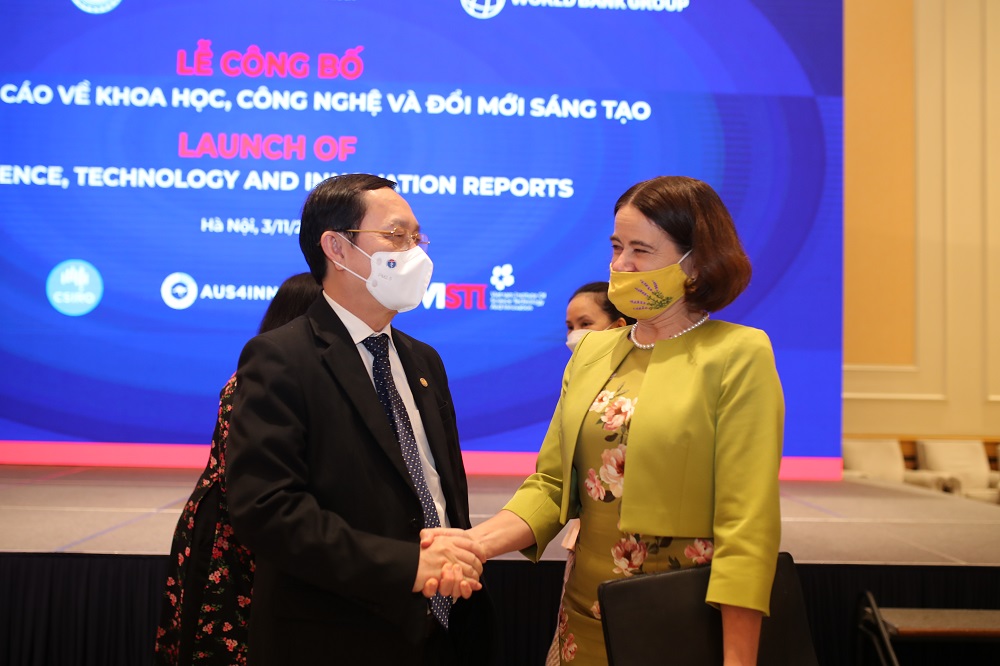 Promoting technology absorption and diffusion, and enhancing human capital will be key to drive sustained economic growth in Vietnam, according to two new reports launched today by Vietnam’s Ministry of Science and Technology (MOST), the Australian Government and the World Bank.
Promoting technology absorption and diffusion, and enhancing human capital will be key to drive sustained economic growth in Vietnam, according to two new reports launched today by Vietnam’s Ministry of Science and Technology (MOST), the Australian Government and the World Bank.
Science, Technology and Innovation in Vietnam
The “Science, Technology and Innovation (STI) Report”, conducted jointly between the World Bank and Vietnam’s Ministry of Science and Technology, examines the current STI policy and development framework, analyzes the bottlenecks that hamper firms from innovating, and proposes a comprehensive reform agenda to spur innovation-led growth.
“Vietnam will need new drivers of economic growth to meet its ambition to become a high-income economy by 2045 and innovation will be fundamental in boosting incomes and improving the quality of growth,” said Carolyn Turk, World Bank Country Director for Vietnam. “But there are different approaches to accelerating innovation and this report presents ideas that could work well for Vietnam
The report suggests that Vietnam should reorient the STI’s policy from supporting cutting edge innovation to promoting adoption and diffusion of technologies among a broad group of firms. Technology diffusion - not just research and invention - can bring significant productivity gains and economic transformation. This is where the government’s interventions and support can have the biggest payoffs.
Building firm capabilities to make the most of state-of-the-art technologies should be the priority. Closing the skills gaps of the workforce - both quality and quantity - will be also important to harness the full power of innovation.
These findings and recommendations are in line with a regional report issued earlier by the World Bank titled “The Innovation Imperative for Developing East Asia”, which was presented at this event. It identifies a mismatch between the innovation policies and institutions and firms’ capabilities and needs, which is common among countries across the region. The region is falling behind advanced economies in the breadth and intensity of new technology use.
The report argues embracing greater innovation could help countries to rise up to set of new challenges to keep growing including global geopolitical frictions, COVID-19, climate change and the noted decline of productivity growth. To foster innovation will require a comprehensive reform agenda. In addition to reorienting STI policies to better match firms’ capabilities and needs, countries should strengthen key complementary factors for innovation such as workers’ skills and access to finance for innovation projects.
Technological change in Vietnam and the contribution of technology to economic growth
The impact of technology adoption is also clearly quantified in the report “Technological change in Vietnam: the contribution of technology to economic growth”, developed by CSIRO, Australia’s national science agency, and Vietnam’s Ministry of Science and Technology.
Delivered through the Aus4Innovation Program, this report provides tools to assess the current situation and impacts of technological progress and innovation on Vietnam's economic growth. By applying economic models to an extensive database of Vietnam business technology adoption, researchers show that technology adoption contributed significantly to the total economic growth to Vietnam over the 2016-2019 period.
Speaking at the launching event, H.E. Ms Robyn Mudie, Australian Ambassador to Vietnam shared “Australia has been supporting Vietnam in making evidence based policy decisions in STI, and this report is another major milestone in our partnership. A team of researchers from Australia and Vietnam have been working on this report for 1.5 years, collecting and analyzing nearly 20 years’ worth of data to develop two modern economic models to quantify the contribution of technology progress to economic growth. We hope that MOST will make good use of this report and these two models to develop practical national STI policies in the long run.”
These reports will be an important reference for policy in the economic transition process of Vietnam out to 2030, with the vision to 2045. It shows that efficiency and innovation play an increasingly important role and overtakes physical capital and cheap labor in the contribution to economic growth.
Outlook for Vietnam
“The reports show how science, technology and innovation as a new engine contributed to Vietnam’s socio-economic growth and how we can move forward to continuous improvement and enabling of our innovation ecosystem” -
Vietnam’s Minister of Science and Technology, H.E. Mr Huynh Thanh Dat said. “We will continue to upgrade the national innovation system for better creation, translation and application of knowledge and technology towards sustainable development goals of the country by 2030 and 2045. We highly appreciate the support of the Australian Government and the World Bank in these efforts and look forward to more collaborative initiatives to turn those thoughtful recommendations and tools into actions”.
Vietnam has seen rapid growth both economically and technologically in the past few years. Strong leadership and institutions will be key for Vietnam to leverage these opportunities and unblock bottlenecks for further economic development./.
For more information on the “Vietnam Science, Technology and Innovation Report”, and the “Innovation Imperative for Developing East Asia” report, please visit: www.worldbank.org.vn, or follow https://www.facebook.com/worldbankvietnam
For more information on the “Technological change in Vietnam: the contribution of technology to economic growth” report, please visit: https://research.csiro.au/aus4innovation/activities/policy-exchange-program/policyexchange-
Contacts:
The World Bank in Hanoi: Le Thi Quynh Anh, (+84-24) 3937-8362, [email protected]
Aus4Innovation Program: Nguyen Thi Hoang Ha, (+84-24) 37740128, [email protected]
VISTI: Cao Thi Thu Anh, (+84) 90411 5551, [email protected]
SATI: Nguyễn Thi Minh Ngoc, (+84) 974 531 506, [email protected]
